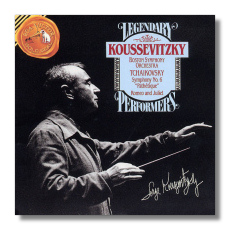
The Internet's Premier Classical Music Source
Related Links
- Tchaikovsky Reviews
- Latest Reviews
- More Reviews
-
By Composer
-
Collections
DVD & Blu-ray
Books
Concert Reviews
Articles/Interviews
Software
Audio
Search Amazon
Recommended Links
Site News
 CD Review
CD Review
Piotr Ilyitch Tchaikovsky

- Symphony #6 in B minor "Pathétique", Op. 74 (1893)
- Fantasy Overture in B minor "Roméo & Juliet" (1869)
Boston Symphony Orchestra/Serge Koussevitzky
RCA 09026-60920-2
While many famous conductors of the early 20th Century have gotten great attention from the labels they recorded for – and even some they didn't – the legacy of Serge Koussevitzky remains largely ignored. I've read negative reviews of his most famous work, but that is also true of Furtwängler and nobody seems to mind reissuing his work. As one of the most diverse and influential musicians of his era, I am frankly puzzled that this great champion of new music and mentor to Leonard Bernstein doesn't get more attention.
The Boston Symphony is in excellent form for this 1930 recording of Tchaikovsky's B minor Symphony. Sure, there are plenty of rather old-fashioned moments – the heavy portamento and somewhat exaggerated transition into the first movement Allegro, for example – but the generally exciting interpretation convinces even today. The sound has been restored well enough on this 1992 issue that we can hear the full glory of the orchestra. Not many orchestras in the United States made music like this in 1930, and the emotional impact is high.
After a direct and supremely effective first movement (that transition isn't all bad), the second movement waltz is lovely. The Boston woodwinds and strings effortlessly dovetail each other, and the only regret is that the bass is rather lacking. Koussevitzky builds the music well, and one understands in a way how Bernstein came to build his later, tension-drenched conception of the same work. When Koussevitzky chooses to slow down or speed up, the results are almost always musical and never disrupt the natural flow of the music. The Boston players seem comfortable following the conductor's wishes, even in an unusually quick third movement March. Here the Boston Symphony displays extraordinary confidence; we generally listen to older recordings for the conductor, not the orchestra. Here, the strings are supremely articulated, and everyone shows off. There is no sense of stress, except perhaps in the upper brass. Otherwise, it's great fun to listen to. The concluding Adagio is flowing and well-phrased, although I'm unsure whether I find it a hair too fast. Bernstein has spoiled me in this respect. The low brass does not entirely stay in tune, which is a pity because the strings above them manage just fine. Still, I challenge anyone to find a better played version this work from 1930, let alone one that's so musically rewarding.
Roméo & Juliet was recorded six years later and features marginal improvements in ensemble and sound. Even on my modest sound system, the harp is intelligently balanced and the playing is first-class. Unsurprisingly, Koussevitzky builds the drama effortlessly, helped in no small part by his orchestra. Since you can more clearly hear the bass lines in 1936, the climaxes are more exciting. The main "Love Theme" is very beautiful, and the overall pacing strikes me as ideal. I don't usually review an issue that's so hard to find, but I gave up on this disc once (I had given it to someone and it was returned to me) and I feel that it's a release of enough historic significance to consider finding.
Copyright © 2015, Brian Wigman



















